- News
- Reviews
- Bikes
- Accessories
- Accessories - misc
- Computer mounts
- Bags
- Bar ends
- Bike bags & cases
- Bottle cages
- Bottles
- Cameras
- Car racks
- Child seats
- Computers
- Glasses
- GPS units
- Helmets
- Lights - front
- Lights - rear
- Lights - sets
- Locks
- Mirrors
- Mudguards
- Racks
- Pumps & CO2 inflators
- Puncture kits
- Reflectives
- Smart watches
- Stands and racks
- Trailers
- Clothing
- Components
- Bar tape & grips
- Bottom brackets
- Brake & gear cables
- Brake & STI levers
- Brake pads & spares
- Brakes
- Cassettes & freewheels
- Chains
- Chainsets & chainrings
- Derailleurs - front
- Derailleurs - rear
- Forks
- Gear levers & shifters
- Groupsets
- Handlebars & extensions
- Headsets
- Hubs
- Inner tubes
- Pedals
- Quick releases & skewers
- Saddles
- Seatposts
- Stems
- Wheels
- Tyres
- Health, fitness and nutrition
- Tools and workshop
- Miscellaneous
- Tubeless valves
- Buyers Guides
- Features
- Forum
- Recommends
- Podcast
review
£169.99
VERDICT:
High quality rucksack but the indicator system seems little more than an expensive gimmick
Weight:
1,100g
Contact:
At road.cc every product is thoroughly tested for as long as it takes to get a proper insight into how well it works. Our reviewers are experienced cyclists that we trust to be objective. While we strive to ensure that opinions expressed are backed up by facts, reviews are by their nature an informed opinion, not a definitive verdict. We don't intentionally try to break anything (except locks) but we do try to look for weak points in any design. The overall score is not just an average of the other scores: it reflects both a product's function and value – with value determined by how a product compares with items of similar spec, quality, and price.
What the road.cc scores meanGood scores are more common than bad, because fortunately good products are more common than bad.
- Exceptional
- Excellent
- Very Good
- Good
- Quite good
- Average
- Not so good
- Poor
- Bad
- Appalling
Port Designs' Go LED Backpack is a superbly made rucksack with copious refinement and an onboard LED indicator system controlled by a wireless bar-mounted pod. Although I've really enjoyed using the bag, those electrics are little more than a gimmick, and the full asking price is hard to swallow.
Talking of which, it's an extremely well-organised 35-litre design made from a very rugged 210 nylon, coated polyester and PU leatherette mix. It's shrugged at the usual rough 'n' tumble of daily commuting, and the wrap-over storm cover means contents will remain dry come hell or high water. It carries a lifetime warranty against defects too.
The slate grey is as neutral as you'll ever need, though reflective piping at select points prevents it becoming too stealthy, and webbed nylon loops make good hosts for flashing red lights.
Flash player
It's the big flashing electrics on the bag that are its USP though. A removable tablet-sized LED board displays a large blue/green directional arrow denoting left/right/forward, along with an emergency function. It reminded me of motorway gantry boards.
Instructions are sent wirelessly via a strap- or handlebar-mounted switch, which is fuelled by two CR2032 batteries and pretty intuitive, even in gloved hands. Aside from a quick precautionary lick of Vaseline on the battery contacts, it seems robust, sniggering at persistent wintry showers and a blast from my garden hose.
In common with bar-mounted computers and similar wireless gizmos, pylons, electricity substations and other sources of interference have made no impression. It has an operating range of 9ft, and at night those chunky arrows were visible to around 250m, though this dips to 100 around town.
Other traffic typically responded with greater caution, in many cases giving more room, but I'm pretty sure this just boiled down to novelty.
Daylight performance isn't comparable with indicators on cars and motorbikes, and after 10 hours of nocturnal riding and five hours during daylight I'm still not convinced that it's a substitute for hand signals (something a smooth-talking defence lawyer could readily exploit in the event of a collision with a negligent driver). And the danger/stop modes managed to confuse my riding companions, who had some inkling as to what they might be, let alone other traffic.
Neat and tidy
As for the bag itself, it's very well made, with the storage space neat and orderly throughout. Outside there's a handy helmet caddy and zippered cubby holes for keys, mini pumps and so on, while inside, a large main compartment swallows a lock, change of clothes, shoes, toiletries, lunch, an A4 pad and other stationery.
Laptop sleeves have been standard issue on messenger bags and better quality rucksacks for the last decade or so. This and the tablet slot are well padded and will manage 15.6in notebooks and 9.5in tablets respectively. There's the obligatory headphone port too, should you fancy some music or take calls during your commute.
> Check out our guide to the 10 best cycling rucksacks here
Now, I should point out that this isn't a cycling-specific rucksack; it's aimed at runners and other outdoor activities, but it sits low enough not to brush against most helmets when glancing over the shoulder.
Personally, anything longer than 10 miles and I'll opt for panniers every time. That said, even with five or six kilos on board, the densely padded shoulder and waist straps offer ample support and prevent it bounding around like a playful labrador. Airflow is very reasonable too, although that familiar damp patch became apparent after seven miles at a steady 18mph.
Number crunching
The £170 price tag can be bettered in many places online, typically £129.99, though it can be found cheaper still, bringing it more in line with other quality luggage.
The LED board charges via USB cable in 4hrs from the mains, 4hrs 35mins from laptops/PCs. Run times will depend upon use, but I've managed about 33 hours from a single charge. By comparison, a waterproof high-vis rucksack cover and winter gloves proved more effective at communicating intentions and require virtually zero maintenance, save for once-overs with a damp cloth.
Verdict
High quality rucksack but the indicator system seems little more than an expensive gimmick
road.cc test report
Make and model: Port Designs Go LED Backpack
Size tested: 35L, Black
Tell us what the product is for, and who it's aimed at. What do the manufacturers say about it? How does that compare to your own feelings about it?
Port Designs says: "Over 3000 cyclists are killed or seriously injured in the UK every year. As cycling becomes increasingly popular, this figure is growing – especially in busy urban areas where the biggest problem is visibility; all too often, riders just aren't being seen by drivers. With nearly two thirds of accidents happening at junctions, it's clear that letting other road users know where you're heading is also vital to staying safe.
"GO LED is a revolutionary backpack with integrated indicator light display. Made for mobility and commuting, GO LED backpack has a flashing LED panel increasing visibility during journeys, sport activities or leisure trips. Developed for cyclists, joggers, skaters and even scooter and roller use, it brings an increased security and visibility day and night thanks to the flashing LED panel and its light reflective bands."
Good quality rucksack but over the shoulder checks and hand signals give much clearer intentions.
Tell us some more about the technical aspects of the product?
Port Designs says: "The LED system can display 4 extra visible navigation signs (left turn, forward, right turn, stop/danger) to inform of direction changes. The LED panel is controlled by a wireless remote control that can be placed on a handlebar or in the dedicated shoulder strap pocket. GO LED has a wide capacity of 35 liters for a ultra-light weight of only 1 kilo. It has all the features of a contemporary backpack with padded laptop and tablet compartments to keep electronic devices safe and various useful pockets. It also has a translucent rain cover protecting the backpack and its content in case of heavy rain and letting LED light flash through".
Rate the product for quality of construction:
8/10
Rate the product for performance:
6/10
Rate the product for durability:
6/10
Really solid rucksack but electrical components are only guaranteed for two years.
Rate the product for weight (if applicable)
5/10
Rate the product for comfort (if applicable)
5/10
Rate the product for value:
5/10
Tell us how the product performed overall when used for its designed purpose
The Port Designs Go LED rucksack is extremely well made and generally comfortable to use – at least over moderate distances with middling loads. However, while the electrical components are similarly well made, for most riders, glancing over the shoulder, hand signalling and manoeuvring is much safer than relying on a very expensive system whose codes are not universally clear.
Tell us what you particularly liked about the product
Solid bag with some nice touches.
Tell us what you particularly disliked about the product
Price and gimmick factor of the electrics.
Did you enjoy using the product? Yes
Would you consider buying the product? No
Would you recommend the product to a friend? Not unless there was a budget version without the technology.
About the tester
Age: 41
I usually ride: Rough stuff tourer based around 4130 Univega mountain bike frameset My best bike is: 1955 Holdsworth Road Path and several others including cross & traditional road
I've been riding for: Over 20 years I ride: Most days I would class myself as: Experienced
I regularly do the following types of riding: cyclo-cross, commuting, touring, fixed/singlespeed, mountain biking
Shaun Audane is a freelance writer/product tester with over twenty-eight years riding experience, the last twelve (120,000 miles) spent putting bikes and kit through their paces for a variety of publications. Previous generations of his family worked at manufacturing's sharp end, thus Shaun can weld, has a sound understanding of frame building practice and a preference for steel or titanium framesets.
Citing Richard Ballantine and an Au pair as his earliest cycling influences, he is presently writing a cycling book with particular focus upon women, families and disabled audiences (Having been a registered care manager and coached children at Herne Hill Velodrome in earlier careers)
Latest Comments
- Terence the Tractor 2 sec ago
Not to discourage the move away from hydrocarbon plastic in any area, but if these biodegradable whats the lifespan of them as bottles? I'm still...
- mdavidford 12 min 54 sec ago
Wait a few months and you'll likely found them deeply discounted on Sportpursuit.
- Mr Blackbird 19 min 4 sec ago
Whatever happens, I am not prepared to pay any further subscription costs. There is so much cycling on telly, that I get bored watching it. Most...
- Rome73 30 min 44 sec ago
I remember driving through rural France many years ago and as the road entered a village or town (not all, but some) there was cut out of a child...
- Rendel Harris 2 hours 55 min ago
They were, however, calling for the total destruction of Northern Ireland as a country, the permanent removal of (what they saw as) an "invader"...
- Dnnnnnn 7 hours 51 min ago
I do wish the reporters would challenge some of the claims made, e.g....
- matthewn5 9 hours 26 min ago
I've got dynamos running B&M StVZO compliant lights. They are bright, but they have a hard upper cut-off so they don't dazzle. They light up...
- ktache 9 hours 58 min ago
Two of the key features are 18 and Not included...
- dubwise 10 hours 42 min ago
Do we really need a rehash of a previous article that is only a few days old? Slow day?
- Johnny Rags 10 hours 44 min ago
Yeah. I was reading some comments made on a radio phone in regarding cyclists wearing hi viz and someone had genuinely phoned in to say something...










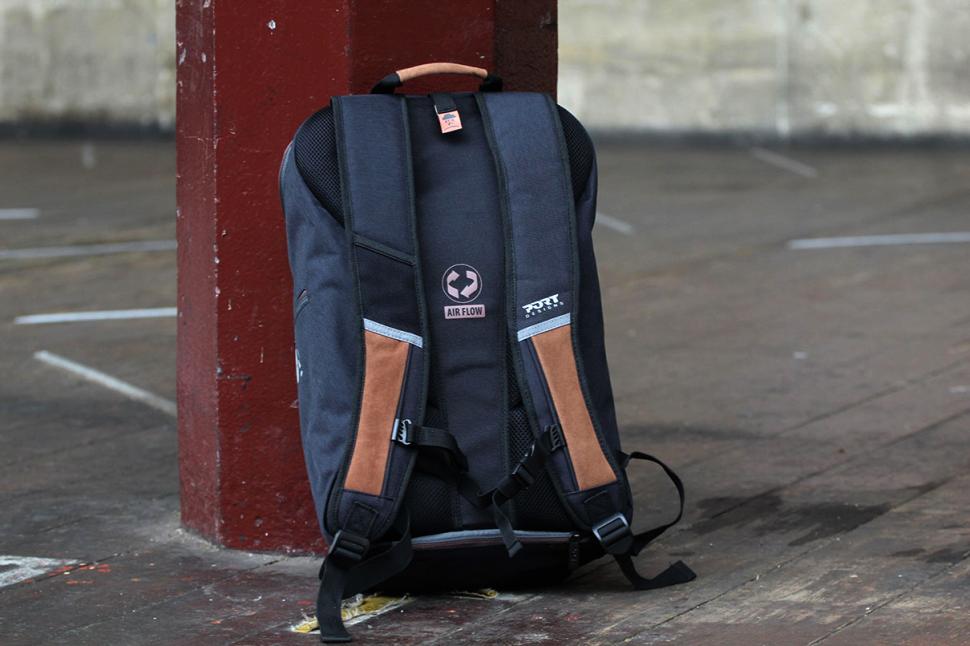
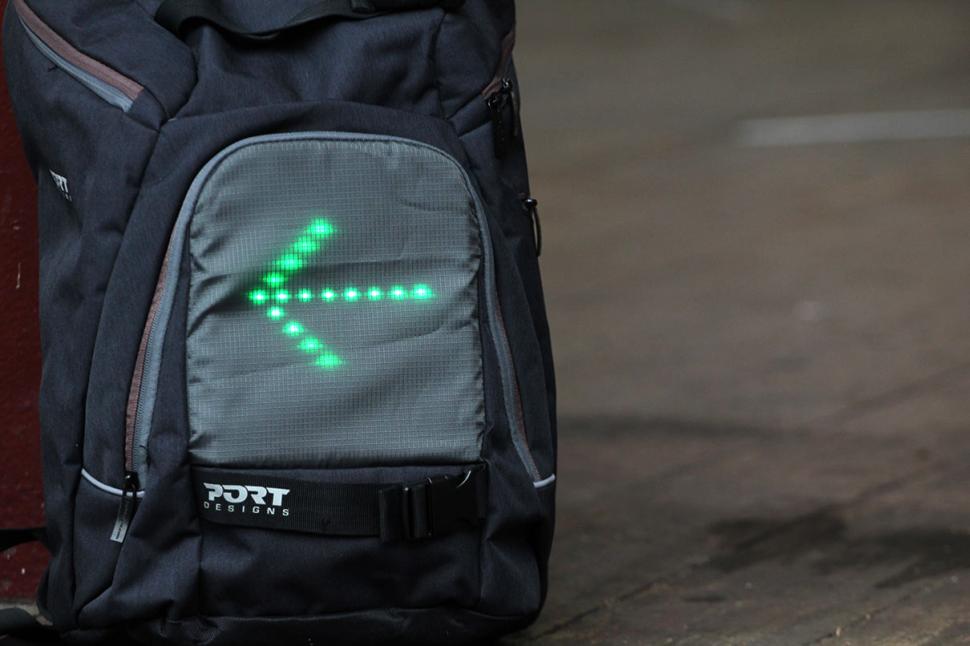
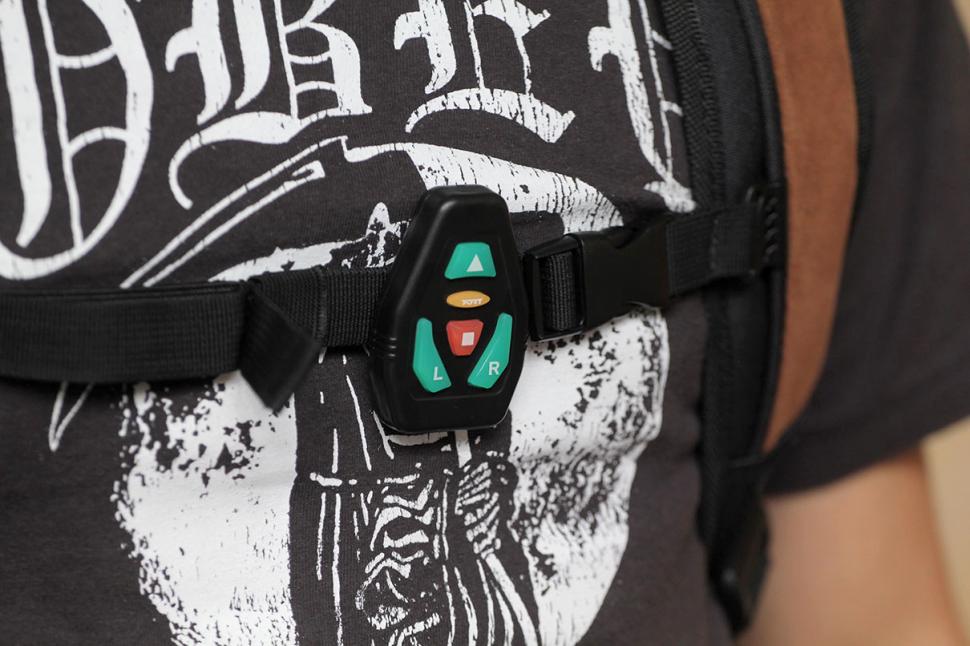

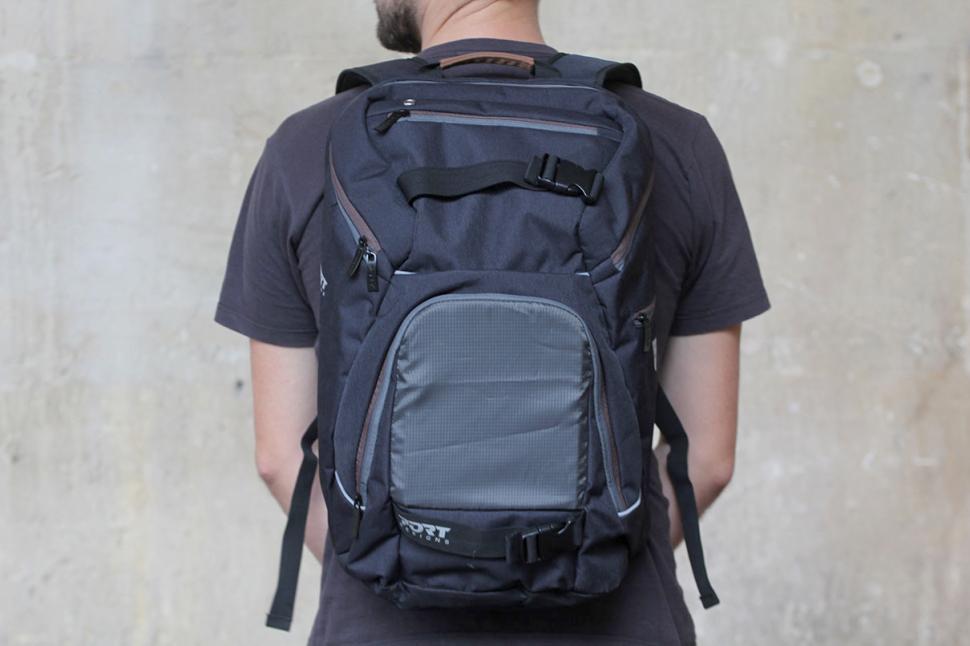

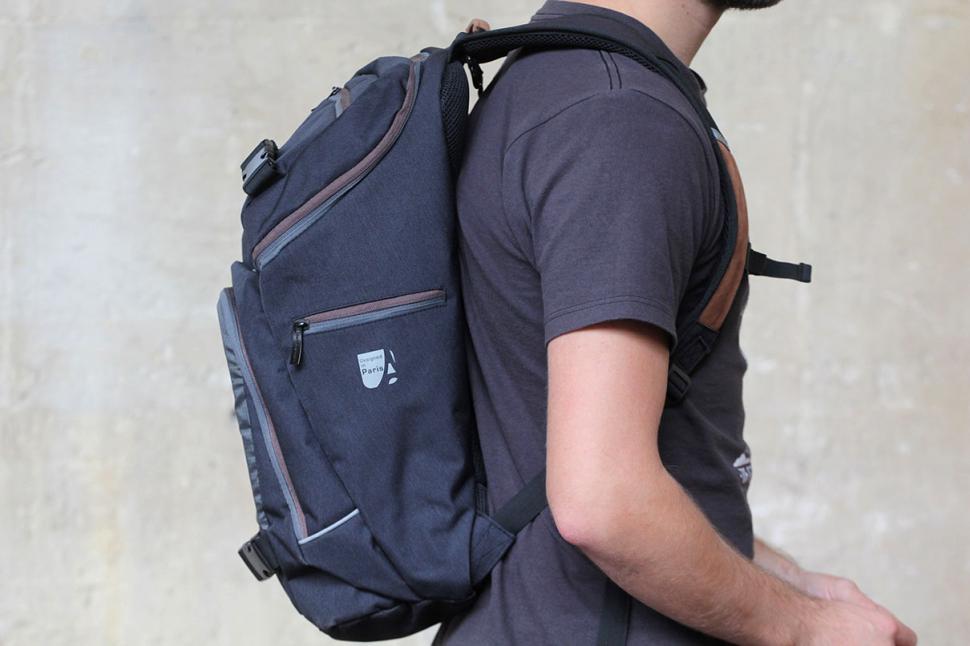
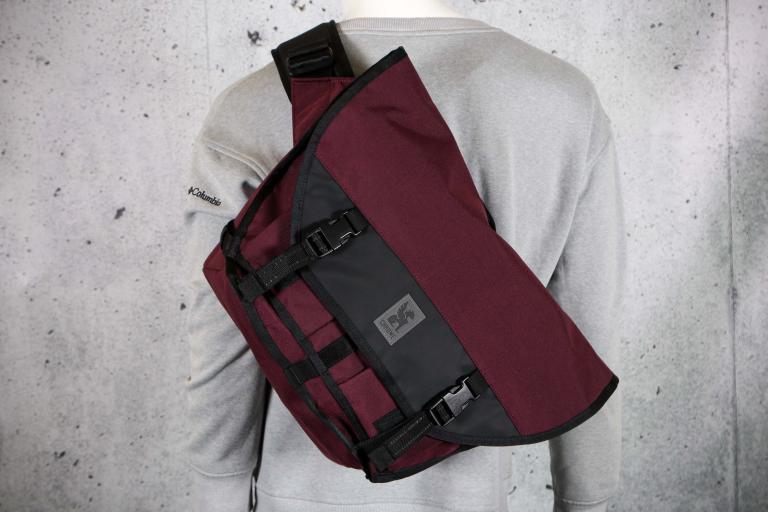
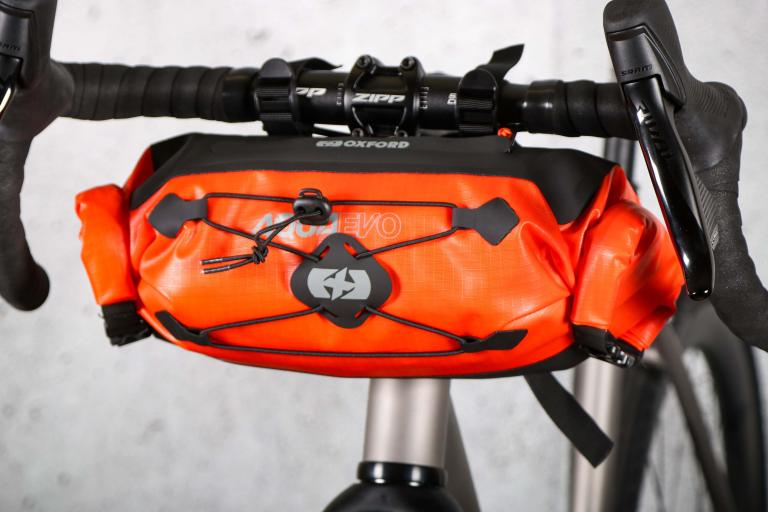
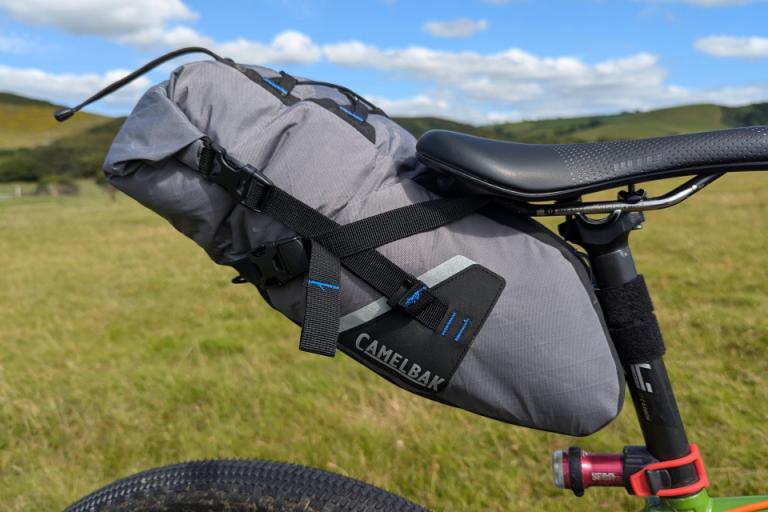
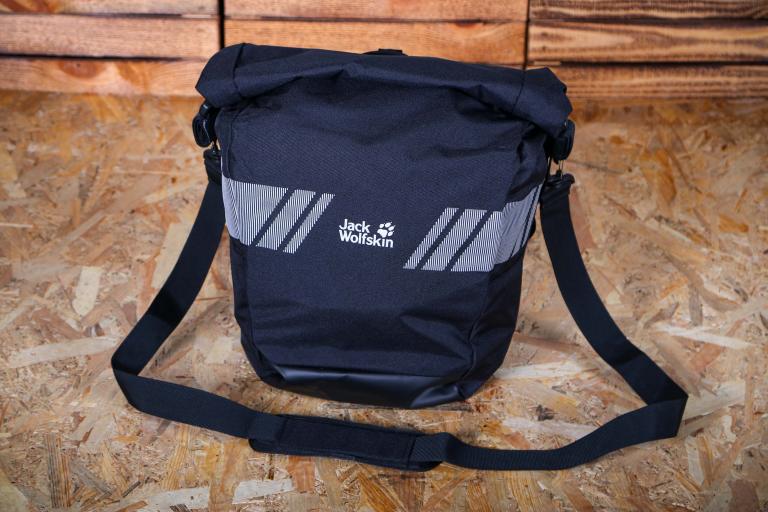
Add new comment
11 comments
My biggest concern is that even if the backpack panel isn't working, the button indicators on the wireless remote control continue to blink. If the panel isn't switched on, or the wireless connection between the remote and the backpack is broken, there is no way of knowing this without a visual inspection of the panel. A proper feedback loop would, say, either prevent the blinking of the remote's buttons, or signal the failure by making the remote's button indicator light solidly unbroken, like on cars. This is such a safety critical issue that I could never trust that the backpack panel is working and would always duplicate with hand signals. This rather defeats the effort.
OK - I get the arrows - but why would you ever need to signal going straight on ? That should be the default ?
Arm signals are clearly more understood though and this would confuse motorists.
There are already backpacks with arrows on arent there ?
http://www.bikeradar.com/commuting/gear/category/accessories/luggage/bac...
So its doubly confusing.
And if the buttons are mounted on the chest harness - you have to press the opposite side of the body to indicate ? It sounds like chaos.
I'm baffled why its a running backpack ? What runner needs that ? 99% of them use pavements. Running after dark on the road is not for the fainthearted and I'd only undertake it with a LOT of lights and reflectives.
(and then you run facing traffic anyway so the arrows at the back are redundant).
What is the emergency signal by the way ?
Struggling to see the point of this - I can't imagine that those indicators are useful at all in daylight, and agree with other commentors that the arrows just seem confusing. I'd rather wear a flashing arm band to ensure drivers can see my arm signals at night.
This is genuinely confusing. If I see the directional arrow does this show that you're indicating to turn in that direction, or is it a suggestion for me to pass on that side? It looks just like the arrows you get on slow-moving motorway lorries telling you to pass on the side.
Agree that there is far too much scope for confusion. Why are the arrows green? Turn signals are amber. Wouldn't use this personally.
It would be much clearer if it was a flashing amber arrow or perhaps triangle or chevron. I'm still not sure I'd use it though. I think the light-up gloves are a much better idea, although reflective bits on gloves are probably adequate.
Agree. The problem with most of these bicycle indicators is that they invent a new kind of signal. Car indicators work as signal because they are standardised - flashing yellow light at the side of the vehicle - so that everybody is familiar with them. Now this rucksack uses green arrows, other gadgets use red arrows, or moving patterns, or whatever. When moving in the rain with reflections on the road and on the windscreen, drivers might not even see it as an arrow or interpret it as a meaningful symbol (rather than just decoration).
All these inventions are focussed on the technology but forget the psychological side. Hand gestures are much better, even when they are physically perhaps less visible than LED arrows, because they are psychologically very strong - pointing at things has been a human gesture for thousands of years, so our brain is really good at processing this intuitively.
If one really wants electronic indicators, they should probably look as much like car/motorbike indicators as possible, so that other road users can intuitively understand them from experience.
I like the idea of this, but do you have any photos of it from behind while riding a bike?
It just looks like the arrows would be too horizontal to be very effective while riding a road bike.
I don't know how it could ever be considered a substitiute for hand signals.. vehicles in front of you can't see it!
I won't be buying it for many of the reasons listed above. And, on the whole, hand signals are much better than anything else - more than anything because that's what drivers are looking for. However, not everybody can make hand signals, and in these circumstances it's good to have an alternative.
Looks shit, expensive